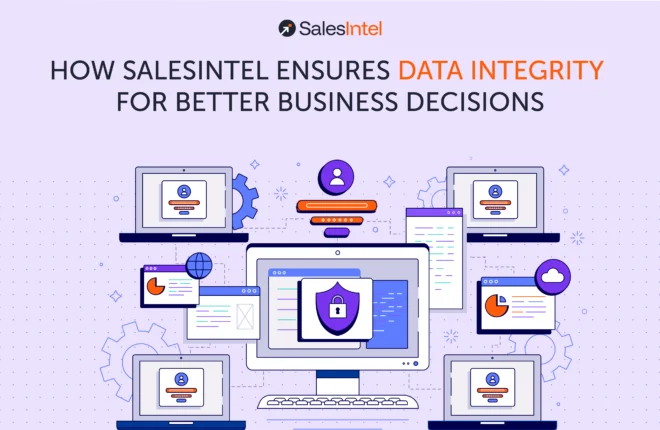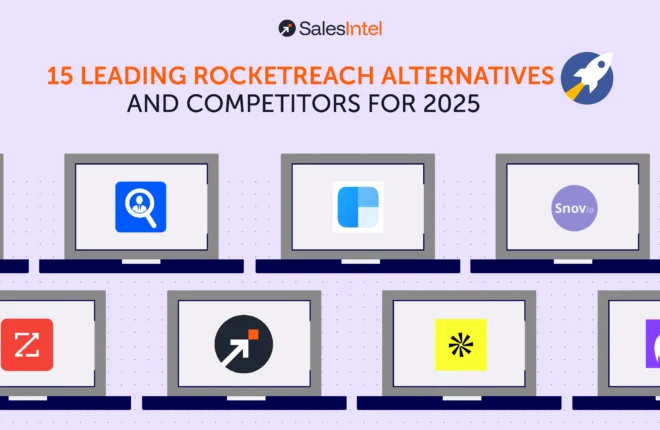AI alters B2B sales approaches and increases effectiveness when it comes to data and forecasting. As Gartner research suggests, 75% of B2B sales organizations will decide to implement AI by 2025 to increase sales efficiency and profitability.
By applying AI solutions, sales teams find out hidden information to identify high potential customers and provide the most suitable solutions with the help of their salespeople but without overloading them. It allows sales staff to focus on complex conversations and address clients.
Key Benefits of AI in B2B Sales
More Relevant Leads
Because of the complex nature of decision-making within organizations, the B2B sales teams often encounter challenges in identifying qualified leads. In lead scoring systems firms use AI technology to assess intent signals and firmographic data to identify potential leads. This halts time from being wasted after unprofitable candidates.
Companies using predictive lead scoring achieve a 15-20% or more year-over-year increase in conversions. AI qualifies leads faster and more accurately than manual methods.
Data-Driven Recommendations
To deliver useful information for sales teams AI processes data from different sources. It includes advice on offering new products along with potential growth and renewal options.
By 2025 Gartner forecasts that 60% of a B2B sales firms will utilize AI advisors for data-based recommendations. This allows an improved personalized and contextual sales method.
Higher Sales Productivity
AI improves efficiency because it can handle mundane activities like data entry and the scheduling of emails in relation to sales. Using an AI text detector assists in responding to automated messages with a friendly and personalized tone that improves relations with clients. By this development, the salespeople are able to concentrate on activities that generate profit than they used to do.
According to a McKinsey analysis, salespeople might free 20-25% of their time for activities aside from selling due to AI technology. This aids their engagement by providing prompt warnings and suggestions at customer meetings.
Implementing effective sales strategies for repeat business requires a well-organized approach that fosters strong customer relationships, and leveraging conversational AI for sales can streamline communication and enhance engagement. This technique not only builds trust—encouraging successful cross-sell and upsell opportunities but also helps convert leads into loyal repeat customers. Meanwhile, a collaborative effort between marketing and sales teams in B2B settings ensures that optimized presentations, objection handling, and lead nurturing drive improved conversion rates.
Improved Forecasting Accuracy
AI algorithms analyze trends and detect signals related to higher conversion rates by examining CRM data. As a result, sales estimates improve over methods based on instinct.
Core Applications of AI in B2B Sales
Next, we will examine the essential uses of AI to transform sales productivity and results.
Lead Scoring and Routing
Inbound leads are commonly more than enough for B2B sales teams. Sales reps invest more than a quarter of their time following improper fit leads. With AI’s help in identifying intent and behavioral signals, leads can be matched with sales-ready prospects.
Generated algorithms identify the most suitable sales agent for an appealing lead according to variables such as assignment and skill set. Leads are channeled immediately to the individual, which is the most effective way to convert them.
Conversation Intelligence
Conversations in sales often yield essential information about consumers. Sales representatives frequently overlook essential details that may affect a negotiation positively or negatively. AI-powered conversation intelligence solutions capture and analyze sales calls using speech recognition and natural language processing.
These tools generate a post-call transcript and highlight key discussion topics, competitive mentions, churn risks, upsell opportunities etc. The AI assistant also provides real-time coaching prompts to the sales rep during a call to rescue deals at risk.
As per Forrester, most B2B sales organizations leverage conversation intelligence to uncover customer needs better and improve win rates.
Intelligent Proposals
Producing customized sales proposals poses a challenge that demands many hours. Within minutes, AI systems can compile proposals by leveraging previous transaction information and effective sales documents.
The AI analyzes important aspects of the upcoming deal, including customer details and contract amount. Next, it develops a proposal outline with costs and communication designs based on the consumer’s requirements. The salesperson takes just a moment to modify and approve the draft prior to forwarding it.
Key Metrics to Track the Impact of AI Adoption
To assess the ROI from AI adoption, sales leaders need to monitor certain quantifiable metrics over time:
1. Lead Conversion Rates
Conversion rates of marketing-qualified leads and sales-qualified leads should significantly spike due to AI lead scoring and routing. A higher relevance of sales-ready leads leads to greater email rates and faster sales cycles.
2. Revenue Per Sales Rep
Using AI reduces the workload for sales reps, allowing them to concentrate more on client interactions. As a result, the average income of every salesperson needs to improve. This rise is assisted by higher productivity and better win rates.
3. Average Deal Size
AI provides the sales reps with past data analysis in relation to the likely value of the deals. It offers effective techniques of selling cross-sells and upsells at the right time in the customer’s journey. With this information in hand, reps can negotiate for higher contract values and premium products, which will enhance average deals.
4. Sales Forecast Accuracy
AI provides a reasonable assessment of pipeline transactions throughout the entire spectrum from initial to the final stages based on measures closely related to completion. Therefore, sales estimation is more accurate than before, and other methods. MAPE can be used for tracking and it will demonstrate how well the accuracy of the forecast improves.
5. Customer Lifetime Value (LTV)
AI reveals accounts prone to developing relationships of significant customer lifetime value. By increasing their efforts to provide personalized experiences for these accounts, the sales and marketing teams can shine. Quantifying customer LTV allows organizations to recognize the revenue outcome of target user acquisition and retention.
Key Challenges in AI Adoption
Despite the immense potential, AI adoption in sales also comes with some inherent challenges:
1. Data Quality Issues
AI thrives due to the data it collects and analyzes. The AI model may produce incorrect insights due to missing or inaccurate data. Staff in sales may accept incorrect or misleading suggestions. Keeping a purged and unified dataset from multiple platforms is crucial.
2. Lack of Skills & Mindset
Sales leaders often underestimate the need to train sales reps on leveraging AI. Motivation and skill sets to interpret AI insights may cause lowered results. Data-driven decision-making must spread throughout the organization.
Historical datasets might include influences from bias issues such as age and ethnicity. Unfair suggestions may arise, leading to the detriment of goals related to diversity, equity and inclusion. To overcome ethical challenges effectively, the AI model requires ongoing evaluation and adjustment.
4. Lack of Trust & Transparency
The opaque characteristics of AI systems frequently lead sales reps to mistrust them. When users do not understand the logic and data behind the model, it significantly impacts their adoption. For AI to function smoothly for sales reps, it is crucial that they understand the justification of each suggestion.
Key Takeaways
Through intelligent suggestions and process automation, AI is redefining the way B2B sales are conducted. Adoption is fueled by the urgent necessity for sales leaders to boost the reliability of forecasts and increase productivity along with conversion rates.
Though AI offers great benefits to efficiency and revenue generation success, it depends on having clean data strategies and user education. By observing metrics, including revenue per representative and lag accuracy, businesses can gauge the financial consequences of AI applications.
For the next few years, B2B firms will compete in the AI-influenced sales landscape. In order to enhance sales growth effectively, companies need to emphasize AI growth and customer satisfaction.




